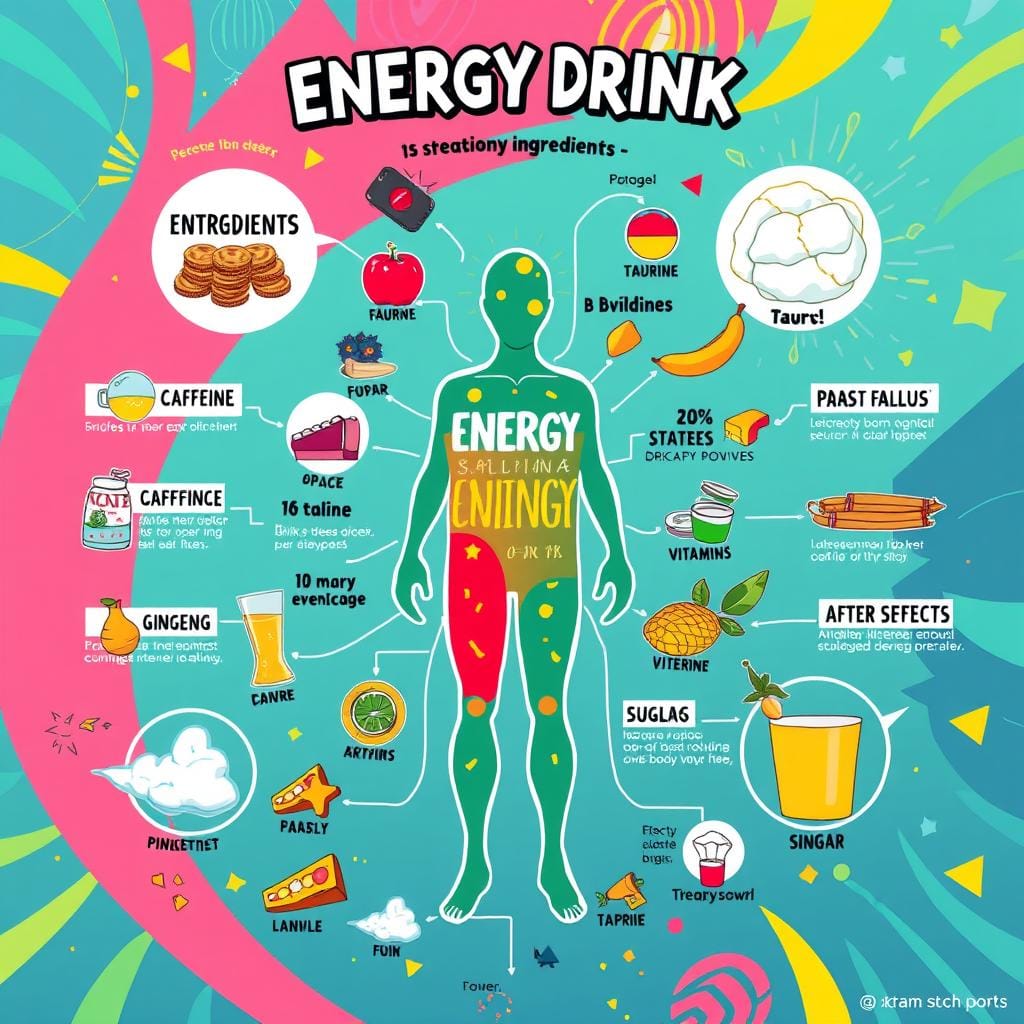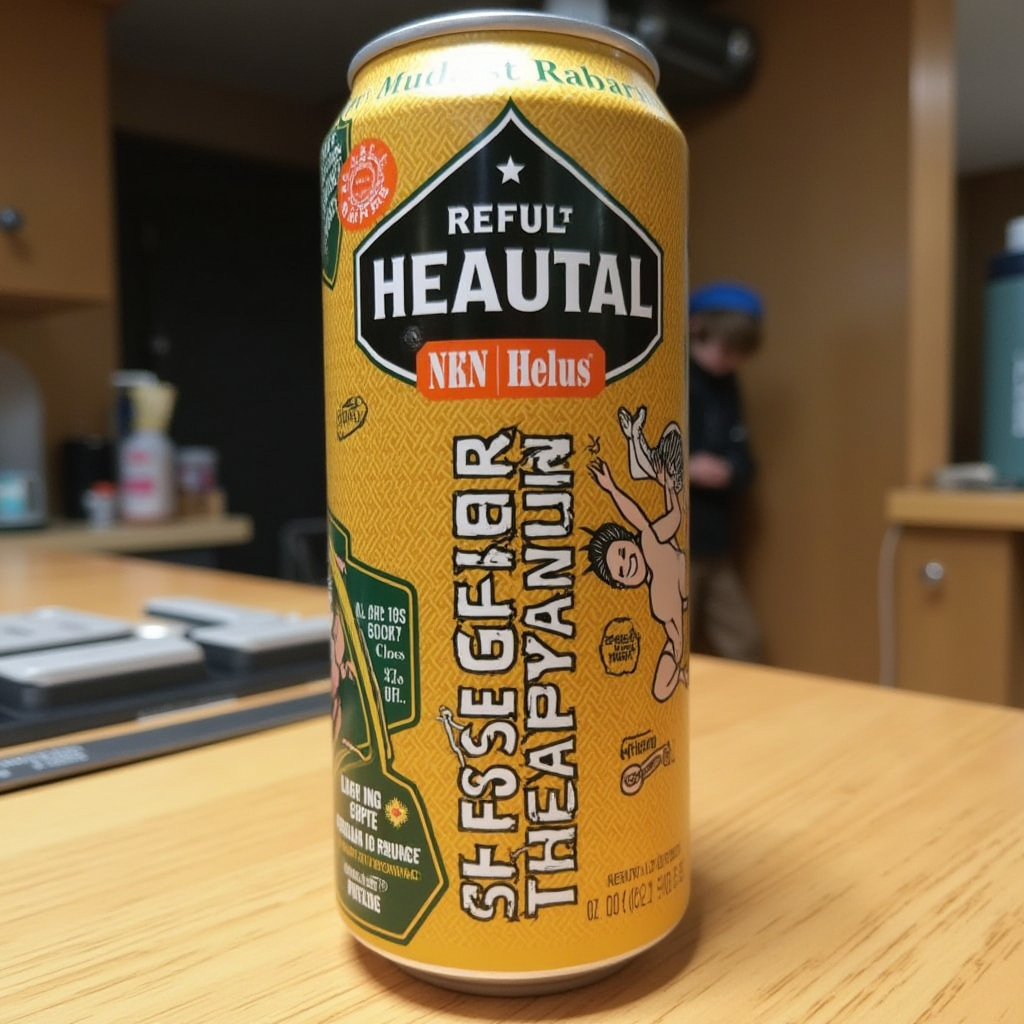Which energy drink is the healthiest? Ever hit that mid-afternoon slump and reached for an energy drink? With so many options claiming to boost energy, it’s worth asking—do they truly offer health benefits?
Looking for a natural energy boost? It’s important to know what’s in your drink. Not all energy drinks are good for you. Some are just filled with sugar and caffeine, giving you a quick buzz but then a big crash.
This guide will help you navigate the energy drink world. We’ll look at the best ingredients, nutritional values, and how they affect your body. You’ll learn how to choose a drink that supports your health and energy needs.
Table of Contents

Key Takeaways
- Energy drinks vary significantly in nutritional value
- Natural ingredients matter more than artificial stimulants
- Healthy energy drinks can support sustained performance
- Caffeine content and source are critical factors
- Understanding label ingredients is essential for health-conscious consumers
Understanding Energy Drink Components and Their Effects
Energy drinks mix many ingredients that affect your body’s performance. Knowing what’s in them is key to choosing wisely for your health.

Natural vs. Artificial Ingredients
Energy drinks have two kinds of ingredients: natural and artificial. Natural ingredients include:
- Green tea extract
- Organic caffeine sources
- Natural fruit juices
- Herbal supplements
Artificial ingredients, on the other hand, have synthetic caffeine, colors, and preservatives. These might harm your health goals.
Impact on Body Functions
Your body reacts in different ways to energy drink ingredients. Caffeine can make your heart beat faster and your mind more alert. It can also boost your metabolism and change your blood pressure.
Short-term and Long-term Effects
Drinking caffeinated beverages has both immediate and long-term health effects. The quick energy boost is a short-term effect. But drinking them often can lead to more serious health issues.
| Ingredient Type | Short-term Impact | Long-term Considerations |
|---|---|---|
| Natural Caffeine | Quick Energy Boost | Sustainable Metabolism Support |
| Synthetic Additives | Rapid Stimulation | Potential Health Risks |
“Understanding your energy drink’s ingredients is key to maintaining optimal health and performance.” – Nutrition Experts
Always talk to healthcare professionals to see how energy drinks affect you.
Key Nutrients to Look for in Healthy Energy Drinks

Looking for a healthy energy drink? Knowing the key nutrients is crucial for your health and performance. The best energy drinks offer more than just caffeine. They add vitamins and minerals that help your body’s natural energy.
“Not all energy drinks are created equal. The right nutrients can transform a simple beverage into a powerful dietary supplement.”
Here are the essential nutrients to find in a healthy energy drink:
- B-Complex Vitamins (B3, B6, B12)
- Support metabolism
- Enhance mental clarity
- Boost energy production
- Electrolyte Minerals
- Potassium
- Magnesium
- Sodium
- Natural Caffeine Sources
- Green tea extract
- Guarana
- Yerba mate
Your ideal energy drink should have a mix of nutrients for lasting energy. Natural caffeine sources give a smoother, longer energy boost than synthetic ones.
| Nutrient | Energy Benefit | Recommended Daily Value |
|---|---|---|
| Vitamin B12 | Energy metabolism | 2.4 mcg |
| Magnesium | Muscle function | 400-420 mg |
| Potassium | Electrolyte balance | 3,400 mg |
Choosing drinks with these nutrients turns your energy drink into a wellness booster. It supports your overall health and performance.
Which Energy Drink Is the Healthiest?
Finding the right energy drink can be tough. You want one that boosts your energy without harming your health. To find the healthiest option, we need to look beyond taste and marketing.
Evaluation Criteria for Performance Boosters
Experts look at several key factors to find the healthiest energy drinks:
- Nutritional content
- Caffeine source and quantity
- Sugar levels
- Presence of natural ingredients
- Absence of artificial additives
Top-Rated Healthy Energy Options
Our research shows some top energy drinks that focus on your health:
| Brand | Natural Ingredients | Caffeine Source | Sugar Content |
|---|---|---|---|
| Guayaki Yerba Mate | Organic herbs | Yerba mate | Low (3g) |
| RUNA Clean Energy | Amazonian guayusa | Plant-based | Zero |
| Hiball Energy | Organic ingredients | Organic caffeine | Zero |
Scientific Research Findings
Studies show that energy drinks with natural caffeine sources and less processing are better for you. Experts say choose drinks that give you energy without artificial stuff.
“The key to a healthy energy drink is understanding its ingredients and their impact on your body.” – Nutrition Expert
When picking your energy drink, choose ones that match your health goals. Look for drinks that give you clean, lasting energy.
Natural Caffeine Sources in Energy Beverages
Looking for healthy caffeinated drinks? Knowing about natural caffeine sources can change your energy drink game. Not all caffeine is the same. Natural ingredients offer benefits that synthetic ones can’t.
Check out these powerful natural caffeine sources found in energy drinks:
- Green Tea Extract: A potent source of natural caffeine with antioxidant properties
- Guarana: Brazilian berry providing sustained energy release
- Yerba Mate: South American herb rich in vitamins and minerals
- Guayusa: Amazonian leaf offering clean, smooth energy
“Natural caffeine sources provide more than just an energy boost – they deliver essential nutrients and health benefits.” – Nutrition Experts
Each natural caffeine source has its own special traits. For example, green tea extract has L-theanine. This helps balance out caffeine’s jittery side effects.
| Natural Source | Caffeine Content | Additional Benefits |
|---|---|---|
| Green Tea Extract | 35-50 mg per serving | Antioxidants, metabolism support |
| Guarana | 40-80 mg per serving | Improved cognitive function |
| Yerba Mate | 30-50 mg per serving | Immune system boost |
When picking energy drinks, go for those with natural caffeine. These ingredients give you lasting energy without artificial stuff. They help you reach your wellness goals.
Sugar Content Analysis of Popular Energy Drinks
It’s key to know the sugar in energy drinks for good health. Many are looking for drinks with less sugar. This is because they care about their health and energy.
Today, there are many choices for those who don’t want a lot of sugar. What you pick can really affect your health and energy.
Zero-Sugar Alternatives
Energy drink brands are now making drinks with no sugar. They want to give you energy without extra calories.
- Stevia-based energy drinks
- Monk fruit sweetener options
- Artificial sweetener formulations
Natural Sweeteners Used
Companies are using natural sweeteners to make energy drinks better. These sweeteners can be good for you and still taste great.
| Sweetener Type | Calories | Glycemic Index |
|---|---|---|
| Stevia | 0 | 0 |
| Monk Fruit | 0 | 0 |
| Erythritol | 0.24 | 1 |
Impact on Blood Sugar Levels
Choosing the right energy drink can really help control blood sugar. Low sugar content drinks avoid big insulin jumps and drops.
“Not all energy drinks are created equal. Choose wisely for sustained energy.” – Nutrition Expert
When picking an energy drink, think about taste, energy, and health. Always read labels and know what sweeteners are used. This helps you make smart choices.
Essential Vitamins and Minerals in Energy Drinks
Exploring energy drink nutrition is key to making smart food choices. Energy drinks are full of important nutrients. These can help keep you healthy and boost your energy.
The most common dietary supplements in energy drinks are:
- B-Complex Vitamins (B3, B6, B12)
- Vitamin C
- Magnesium
- Potassium
- Calcium
These nutrients are vital for your body’s energy and how it works. B-vitamins help turn food into energy. Minerals like magnesium help your muscles and nerves.
“Not all energy drinks are created equal. The quality and quantity of vitamins can significantly impact their nutritional value.” – Nutrition Expert
When picking an energy drink, choose ones with clear labels about their vitamins and minerals. Some brands offer more nutrients than others. This gives you a better energy boost.
Remember, while these vitamins and minerals are good, they shouldn’t replace eating real food. A balanced diet is still essential.
Clean Energy Drinks: Examining Natural Brands
The world of energy drinks is changing. People want healthy ingredients and drinks that are good for the planet. Natural energy drink brands are answering this need by using organic ingredients and caring for the environment.
Looking into clean energy drinks, you’ll see brands that do more than just market themselves. They’re changing the game by making responsible, natural caffeine sources.
Organic Ingredients Matter
Top natural energy drink brands focus on quality. They use:
- Plant-based caffeine sources
- Certified organic botanical extracts
- No artificial preservatives or colors
- Non-GMO ingredients
Sustainability Practices
Leading clean energy drink makers are working to lessen their environmental impact. They use:
- Recyclable packaging
- Carbon-neutral production
- Supporting regenerative agriculture
- Eco-friendly suppliers
“Our mission is to create energy drinks that nourish both people and the planet” – Sustainable Beverage Industry Leader
Environmental Impact
More and more people are thinking about the planet when they choose drinks. Natural energy drink brands are stepping up with big sustainability efforts.
By picking clean energy drinks, you’re doing more than just drinking. You’re helping create a greener future.
Performance Benefits and Athletic Enhancement
Athletes and fitness fans are always looking for ways to improve. Energy drinks are key in boosting physical and mental performance. They help in many sports and activities.
- Enhanced mental focus and concentration
- Increased metabolic rate
- Improved muscle endurance
- Faster reaction times
Studies show energy drinks can really help athletes. The right mix of ingredients can:
- Boost energy before workouts
- Lessen muscle tiredness during hard training
- Help recover faster after exercise
“The right energy drink can be a game-changer for athletes seeking optimal performance.” – Sports Nutrition Research Institute
Look for these key ingredients in energy drinks:
| Ingredient | Performance Benefit |
|---|---|
| Caffeine | Increases alertness and reduces perceived exertion |
| Electrolytes | Supports hydration and muscle function |
| B-Vitamins | Enhances energy metabolism |
| Amino Acids | Promotes muscle recovery and reduces fatigue |
Remember, everyone reacts differently to energy drinks. Always talk to a sports nutritionist for a plan that’s just right for you.
Potential Health Risks and Considerations
When looking for the healthiest energy drink, knowing the risks is key. Caffeinated drinks can affect your body in many ways. It’s important to know how they work.
Energy drinks and supplements need careful thought to stay safe. Your health matters a lot in figuring out risks.
Caffeine Sensitivity
Not everyone reacts the same to caffeine. Some people feel more effects, like:
- Increased heart rate
- Anxiety or jitteriness
- Sleep disruptions
- Potential digestive issues
Medication Interactions
Energy drinks can mix badly with medicines. Always talk to your doctor before drinking them often.
“Understanding your body’s unique response to energy drinks is critical for maintaining optimal health.” – Nutrition Expert
Daily Consumption Limits
Knowing your limits is smart. Experts say:
- Stick to 1-2 energy drinks a day
- Don’t drink them late at night
- Watch your caffeine intake
- Drink plenty of water
By knowing these tips, you can choose energy drinks wisely. This helps keep your health in check.
Reading and Understanding Energy Drink Labels
Energy drink nutrition can be hard to figure out. When you grab an energy drink, the label is key to knowing its health benefits. By understanding these labels, you can make better choices and pick drinks with good ingredients.
- Serving size and number of servings per container
- Calorie content
- Caffeine amount
- Sugar content
- Vitamin and mineral composition
“Knowledge is power when it comes to understanding what you’re consuming” – Nutrition Expert
For those watching their health, it’s important to look for low sugar content. Choose drinks with little added sugar or natural sweeteners. The nutrition facts will show the sugar grams per serving.
| Label Component | What to Look For |
|---|---|
| Caffeine | Less than 200mg per serving |
| Sugar | Less than 25 grams |
| Added Vitamins | B-complex, Vitamin C |
Check the ingredient list carefully. Healthy ingredients should be listed first. Opt for natural extracts like green tea, ginseng, or guarana over artificial stimulants.
Start reading labels like a detective. Choose energy drinks that match your nutritional needs and give you the energy you want.
Best Times to Consume Energy Drinks
Knowing when to drink energy drinks can really help. They give you a quick energy boost if you drink them at the right time.
Your body needs energy at different times of the day. Here are the best times to drink energy drinks:
- Morning Kickstart: Between 9-11 AM, when natural cortisol levels begin to dip
- Pre-Workout: 30-45 minutes before physical activity for maximum performance
- Mid-Afternoon Slump: Around 2-3 PM when productivity typically decreases
Drinking energy drinks at certain times can help more than harm. But, don’t drink them too close to bedtime. They can mess up your sleep.
“Timing is everything when it comes to energy drink consumption” – Nutrition Experts
Here are some smart ways to drink energy drinks:
- Never consume on an empty stomach
- Limit intake to one drink per day
- Stay hydrated with water alongside your energy drink
Everyone reacts differently to energy drinks. Listen to how your body feels and adjust your drinking habits.
Conclusion
Choosing the healthiest energy drink means looking at many things. You should focus on natural ingredients, low sugar, and science-backed nutrition. Brands like Celsius, Guayaki Yerba Mate, and RUNA are good choices.
Healthy ingredients are key to a good energy drink. Look for organic caffeine, few artificial additives, and vitamins that help your body. Choose drinks that give you energy that lasts, not a quick crash.
Your health goals and lifestyle should help pick your energy drink. Talking to a nutritionist can help match drinks to your diet. Always check labels, watch your caffeine, and remember to drink in moderation.
The best energy drink supports your health journey. By choosing wisely, you can boost your energy without harming your health or nutrition.


1 thought on “Which Energy Drink Is the Healthiest? – Top Choices”